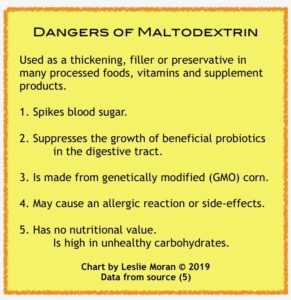
Dangers of Maltodextrin in Parrot Supplements
While most people think that ‘Parrot Supplements’ are good for their birds, it’s essential to read the ‘fine print’ on the label. When you start reading labels you’ll quickly understand that many parrot supplements contain unhealthy ‘filler’ ingredients masquerading as something that is supposed to be healthy for your birds. Maltodextrin is just one of these unhealthy—but commonly used—filler ingredients. Filler ingredients are used to falsely increase the volume of the product it is added to.
As you learn more about the Problems with Parrot Supplements, you’ll want to read my blog post, “Parrots Don’t Need Supplements”.
Why They Add It
Maltodextrin is used as a thickener, filler or preservative in many processed foods and in vitamin and herbal supplements for people and in parrot supplements. It is an artificially produced white powder that can be made from any starch. It is most commonly made from corn, rice, potato starch or wheat. Although maltodextrin is made from ‘natural’ foods it is a highly processed product that has zero nutritional value and has many harmful side effects.
.
Maltodextrin–Made From GMO Corn
Most maltodextrin is made from genetically modified organisms (GMO) corn. All nonorganic corn crops contain GMOs. GMOs are bad for us, bad for our birds and bad for the planet. Several year ago I saw a documentary explaining the problems with GMOs. GMOs cause such far-reaching health problems that ranchers refuse to feed GMO corn to their cattle, and other livestock, because they lost the ability to reproduce. This is a very serious and dangerous side effect of all GMO products.
.
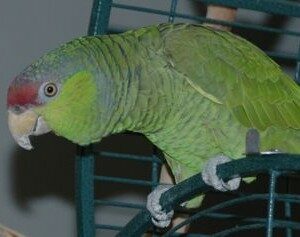
Lilac-crowned Amazon.
Maltodextrin Spikes Blood Sugar Levels
Maltodextrin is a polysaccharide, this is a type of carbohydrate. It is easily absorbed and gets into the bloodstream quickly. Maltodextrin contains sky-high levels of unhealthy carbohydrates. And if these high-calorie carbohydrates are not used for energy (from focused exercise) they easily become stored in the body as excess fat.
Because maltodextrin is so quickly absorbed, this means it can spike blood sugar levels. This can be especially problematic if you care for a species of parrot prone to diabetes mellitus such as budgerigars (budgies or parakeets), cockatiels, Amazon parrots, Scarlet macaws, Umbrella cockatoos and the Toco Toucan.(1) Maltodextrin should never be fed to birds in parrot supplements.
.
Sky-High Glycemic Levels
Maltodextrin’s glycemic index levels are 1.6 to 2 times higher than white table sugar, that has a glycemic level of 65.(5)
.
Suppresses Healthy Gut Bacteria
Maltodextrin changes the composition of the naturally occurring healthy gut bacteria by suppressing the growth of these beneficial probiotics. Research done at the Lerner Research Institute, in Ohio, found that polysaccharides like maltodextrin have been linked to bacteria-associated intestinal disorders. According to these researchers, the increasing consumption of polysaccharides in Western diets parallels an increased incidence of Crohn’s disease (Inflammatory Bowel Disease) during the late 20th century. The maltodextrin in parrot supplements causes the exact opposite from what people are hoping to achieve.
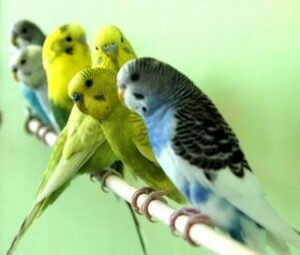
These 7 Budgies love our sprouting blends.
Maltodextrin Linked to Autoimmune Diseases
A 2012 study found that maltodextrin increased bacterial adhesion to human intestinal epithelial cells and enhanced E. coli adhesion, which is associated with autoimmune disorders.(2) Even more research points out that maltodextrin promotes the survival of salmonella, which may be responsible for a broad range of chronic inflammatory diseases.(3)
.
.
Maltodextrin Causes Inflammatory Bowel Disease
A study conducted at the Mucosal Immunology and Biology Research Center in Boston also indicates that maltodextrin impairs cellular antibacterial responses and suppresses intestinal antimicrobial defense mechanisms, leading to inflammatory bowel disease and other conditions that arise from an inappropriate immune response to bacteria.(4)
.
Can Cause Allergies
Maltodextrin is bad for parrots because it can cause an allergic reaction or side effects. In people we see these as GI symptoms, gas, diarrhea, skin irritations, cramping and bloating.
.
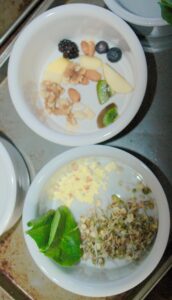
A balanced Macaw-sized meal.
.
.
No Supplements Needed for Parrots
When people follow and feed my “Balanced Exotic Avian Maintenance Diet Food Plan” no supplements are needed. This balanced approach to avian nutrition provides an abundance of nutrient foods, in the proper balance for your birds. Each food contains nutrients and each food is fed in proportion with the other foods in the Basic Plan. To learn more, please read my blog post, “Parrots Don’t Need Supplements”.
.
.
.
Resources:
(1) “Avian Medicine: Principles and Application”, Branson Ritchie, DVM, Greg Harrison, DVM, Linda Harrison.
(2) Nickerson KP, McDonald C (2012) Crohn’s Disease-Associated Adherent-Invasive Escherichia coli Adhesion Is Enhanced by Exposure to the Ubiquitous Dietary Polysaccharide Maltodextrin. PLoS ONE 7(12): e52132. doi:10.1371/journal.pone.0052132 . Accessed August 29, 2019.
https://www.ncbi.nlm.nih.gov/pmc/articles/PMC3520894/pdf/pone.0052132.pdf
(3) Nickerson KP, Homer CR, Kessler SP, Dixon LJ, Kabi A, Gordon IO, Johnson EE, Motte CA, McDonald C, (2014) The Dietary Polysaccharide Maltodextrin Promotes Salmonella Survival and Mucosal Colonization in Mice. PLoS One. 2014; 9(7): e101789. doi: 10.1371/journal.pone.0101789 . Accessed August 29, 2019.
https://www.ncbi.nlm.nih.gov/pubmed/25000398
(4) Nickerson KP, Chanin R, McDonald C, Deregulation of intestinal anti-microbial defense by the dietary additive, maltodextrin. Gut Microbes 6:1, 78–83; January/February 2015; Published with license by Taylor & Francis Group, LLC. http://dx.doi.org/10.1080/19490976.2015.1005477 . Accessed August 29, 2019.
https://www.ncbi.nlm.nih.gov/pubmed/25738413
(5) “Top 5 Dangers of Maltodextrin + 5 Healthier Substitutes”, Christine Ruggeri, CHHC, Dr Axe Food Is Medicine, January 12, 2017. https://draxe.com/maltodextrin/ . Accessed 12-29-18.
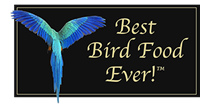





1 Comment